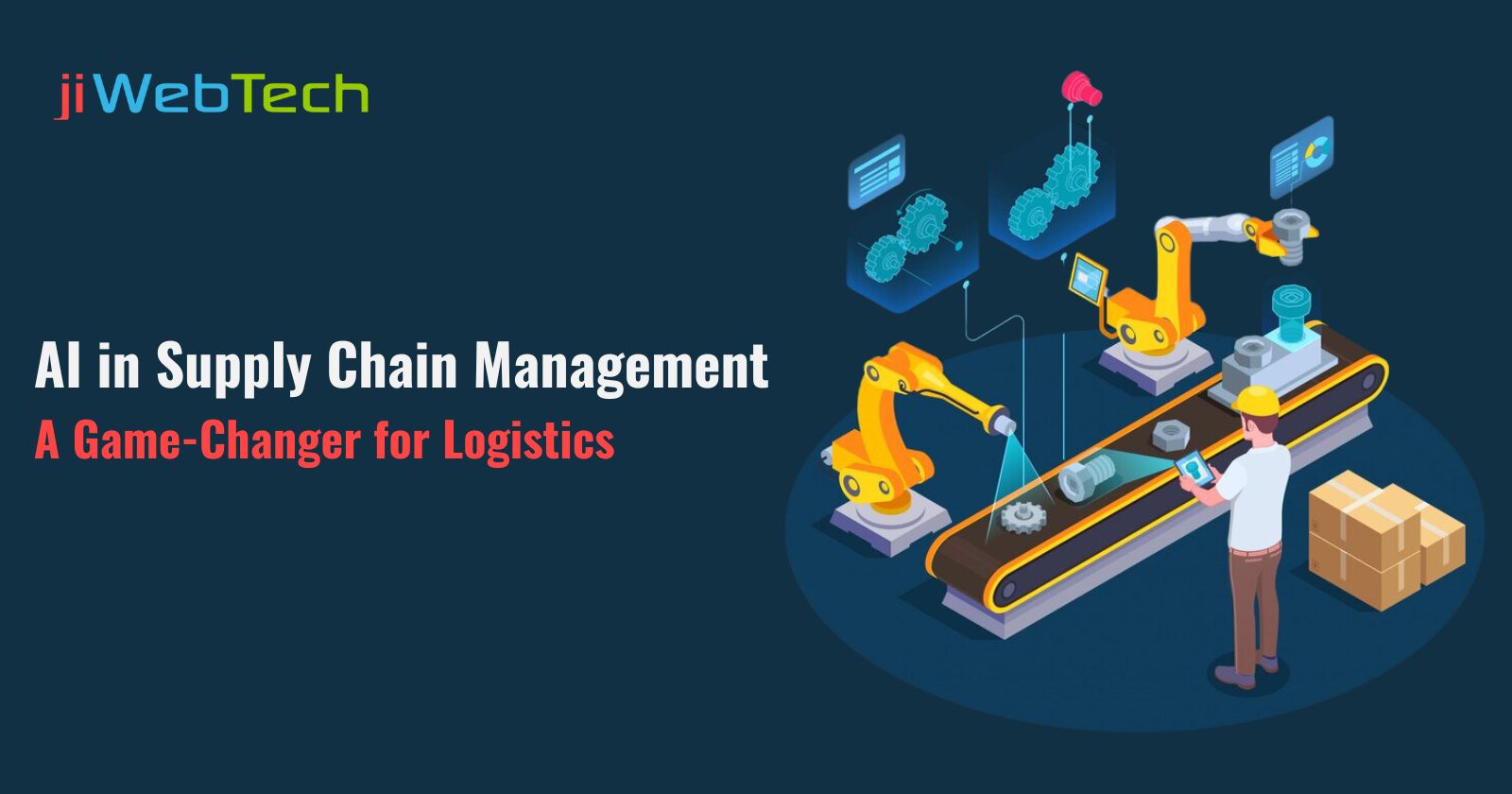- Feb 07, 2025
- Generative Ai
- 2566
Share this post on:

In the modern world, supply chain management (SCM) plays a pivotal role in the success of businesses, influencing everything from procurement and production to delivery. Over time, the integration of technology has revolutionized this field, and one of the most disruptive forces in recent years has been Artificial Intelligence (AI). As AI continues to evolve, it has emerged as a game-changer for logistics, streamlining operations, improving efficiency, and enhancing decision-making across the entire supply chain.
This article delves into the transformative impact of AI on supply chain management, specifically in logistics, and explores the benefits, challenges, and future possibilities.
The Evolution of Supply Chain Management
Historically, supply chain management was a relatively straightforward process. Manufacturers procured raw materials, produced goods, and delivered them to retailers, who then sold them to consumers. While the fundamental principles of SCM have remained largely the same, the complexity and scale of global supply chains have grown exponentially. Today’s supply chains span continents and involve multiple stakeholders, including manufacturers, distributors, transportation companies, and retailers.
To manage this complexity, businesses have adopted various technological advancements over the years. In the early stages, Enterprise Resource Planning (ERP) systems were introduced to streamline operations. In recent years, the advent of the Internet of Things (IoT), blockchain, and big data analytics has further transformed supply chain management.
However, perhaps the most significant leap forward has been the integration of Artificial Intelligence into supply chain management, particularly in logistics. AI offers the potential to automate tasks, optimize processes, and provide real-time insights, creating a more agile and efficient supply chain. Let’s take a closer look at how AI is transforming logistics.
How AI is Revolutionizing Logistics in Supply Chain Management
AI is fundamentally changing how logistics is managed and executed. From route optimization to inventory management, the use of AI technologies is streamlining various aspects of logistics. Below are some of the key areas where AI is making a significant impact:
1. Demand Forecasting and Inventory Optimization
One of the core challenges in logistics is managing inventory efficiently. Over-stocking leads to unnecessary storage costs, while under-stocking can result in stockouts and lost sales. Traditional methods of inventory management were often based on historical data and manual processes, but AI-driven tools are improving the accuracy and efficiency of demand forecasting.
By analyzing historical sales data, market trends, and external factors like weather patterns or holidays, AI algorithms can predict future demand with high accuracy. This allows businesses to optimize their inventory levels, ensuring that they have the right amount of stock at the right time. AI-powered demand forecasting can also help businesses make more informed decisions about procurement, production schedules, and distribution plans.
2. Route Optimization and Fleet Management
The logistics industry heavily relies on transportation, and optimizing delivery routes is crucial to improving efficiency and reducing costs. Traditionally, route planning was a manual and time-consuming process, often relying on drivers to choose the best routes. However, AI has introduced the possibility of real-time route optimization, allowing businesses to reduce fuel consumption, cut delivery times, and enhance overall logistics performance.
AI-powered route optimization tools can analyze vast amounts of data, including traffic conditions, weather, and delivery schedules, to suggest the most efficient routes for drivers. This helps logistics companies avoid delays, minimize fuel consumption, and improve customer satisfaction by ensuring timely deliveries.
Furthermore, AI is also transforming fleet management. By monitoring the performance of vehicles in real-time, AI can predict when a vehicle requires maintenance or when it is likely to break down. This predictive maintenance helps businesses reduce downtime, extend the lifespan of their fleet, and avoid costly repairs.
3. Warehouse Automation
Warehousing is a critical aspect of logistics, and AI is playing an essential role in automating and optimizing warehouse operations. In the past, warehouses relied heavily on manual labor for tasks like inventory management, order picking, and packing. However, AI-driven robots and automated systems are increasingly being used to streamline these processes.
For instance, AI-powered robots can autonomously navigate warehouses, picking and packing items with precision and speed. Machine learning algorithms are used to optimize inventory management, ensuring that goods are stored in the most efficient manner possible. This not only reduces labor costs but also improves the accuracy of order fulfillment and speeds up the entire warehousing process.
Moreover, AI can improve warehouse layout planning by analyzing data on product movement and order patterns. By organizing products based on demand frequency, AI can help ensure that fast-moving items are placed in more accessible locations, reducing the time it takes for workers or robots to pick and pack orders.
4. Predictive Analytics for Risk Management
Supply chain risks are inevitable, whether due to natural disasters, political unrest, or supply disruptions. Traditional risk management methods often rely on historical data and reactive strategies, but AI offers the ability to anticipate risks before they occur.
By analyzing large volumes of data from multiple sources, AI can identify potential risks and disruptions in real time. For example, AI can monitor weather patterns, news reports, and social media to detect early signs of supply chain disruptions, such as strikes or natural disasters. Armed with this information, businesses can proactively adjust their supply chain strategies, reroute shipments, or secure alternative suppliers, minimizing the impact of disruptions.
5. Last-Mile Delivery
The last mile, which refers to the final leg of the delivery journey from a distribution center to the customer, has always been a challenge for logistics companies. It is often the most time-consuming and costly part of the delivery process. However, AI is transforming last-mile delivery by optimizing routes, automating delivery processes, and even exploring the use of autonomous vehicles.
AI algorithms can analyze data such as delivery addresses, customer preferences, traffic conditions, and delivery windows to create the most efficient last-mile delivery plans. This not only reduces delivery costs but also improves the customer experience by ensuring faster and more reliable deliveries.
Furthermore, the rise of drones and autonomous delivery vehicles, powered by AI, is poised to revolutionize last-mile logistics. These technologies could reduce the need for human drivers, lower delivery costs, and speed up delivery times, especially in urban areas where traffic congestion is a significant issue.
Benefits of AI in Supply Chain Management
The integration of AI into logistics offers a range of benefits that can significantly improve supply chain performance:
Increased Efficiency: AI automates repetitive tasks, freeing up human workers to focus on more strategic activities. This results in more efficient processes, faster delivery times, and reduced operational costs.
Better Decision-Making: AI provides real-time insights and predictive analytics that enable businesses to make data-driven decisions. This improves the accuracy of forecasts, inventory management, and risk mitigation strategies.
Cost Savings: AI-driven optimizations, such as route planning, inventory management, and fleet maintenance, help reduce costs associated with fuel, storage, and labor.
Improved Customer Satisfaction: Faster deliveries, accurate order fulfillment, and proactive communication with customers help improve the overall customer experience.
Scalability: As businesses grow, AI systems can easily scale to accommodate higher volumes of data and more complex logistics operations.
Challenges and Considerations
While AI offers tremendous potential, it is not without its challenges. Here are some of the key hurdles businesses may face when implementing AI in supply chain management:
Data Quality: AI systems rely on high-quality data to deliver accurate insights. Incomplete, outdated, or inaccurate data can hinder the effectiveness of AI solutions.
Cost of Implementation: The initial investment required to implement AI-driven solutions can be significant, especially for small to mid-sized businesses. This includes the cost of technology, training, and system integration.
Skill Shortages: The successful implementation of AI requires specialized skills, including data science, machine learning, and AI system management. Finding and retaining talent in these areas can be challenging.
Ethical Concerns: AI decision-making processes can sometimes lack transparency, raising concerns about biases in algorithms or unfair treatment of certain groups. It’s essential for businesses to address these ethical considerations and ensure fairness in AI systems.
The Future of AI in Supply Chain Management
As AI continues to evolve, its impact on supply chain management will only grow stronger. Future advancements could include more sophisticated machine learning algorithms, enhanced automation, and further integration of AI with other emerging technologies, such as blockchain and 5G.
The rise of autonomous vehicles and drones for deliveries, as well as AI-driven smart warehouses, could significantly reshape the logistics landscape. Moreover, AI’s ability to predict and mitigate risks will play an increasingly important role in managing global supply chain disruptions, especially in an era of geopolitical uncertainty and climate change.
Conclusion: The Role of JiWebTech in AI-Driven Logistics
As we’ve seen, AI has the potential to revolutionize logistics and supply chain management by improving efficiency, reducing costs, and enhancing customer satisfaction. However, for businesses to fully leverage AI, they need the right expertise and tools.
jiWebTech offers advanced AI-powered solutions that can help businesses optimize their logistics operations. With a focus on machine learning, data analytics, and AI-driven automation, jiWebTech helps organizations navigate the complexities of modern supply chains. Whether it’s optimizing delivery routes, forecasting demand, or enhancing warehouse automation, jiWebTech provides businesses with the tools they need to stay competitive in a rapidly evolving market.









